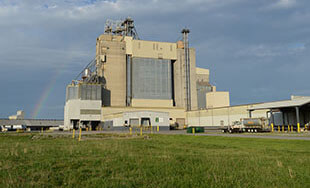Food-grade measures
Sep 02, 2019

Food safety is critical to our national security. We are fortunate to live in a nation that puts so much effort and focus on protecting the integrity of our food supply. You can be sure the United States has the safest food supply in the world.
With that thought in mind, Tennessee Farmers Co-op takes its role in food safety very seriously as well. Customers using Co-op feed can have confidence that much care is taken to provide them with a safe, dependable product. The employees at TFC understand that, while we are not raising livestock, we are a vital link in the food animal production chain. TFC feed mills follow strict precautions and procedures to ensure the safety and quality of Co-op feeds throughout the manufacturing process.
Co-op operates three feed mills across the state — at Jackson in West Tennessee, Tenco near Rockford in East Tennessee, and at TFC’s LaVergne headquarters in Middle Tennessee. Each of these facilities follow safety protocols similar to those required of a food manufacturing plant.
To maintain these safety protocols, all Co-op feed mills comply with the Food Safety Modernization act (FSMA), are FDA certified, and are certified by the American Feed Industry Association (AFIA) as a Safe Feed/Safe Food feed mill. In all of the cases, the mills are inspected and audited on a regular schedule to ensure compliance.
As a part of these food safety measures, we monitor the integrity of inbound feed ingredients, which will be used in the production of complete feed products. All ingredients are screened for foreign material before being unloaded. In addition, drivers delivering ingredients must verify what they last hauled and, if it was something not conducive to food safety, must prove their equipment was properly washed out before hauling our ingredient. If these inspections fail, the ingredient is rejected.
All medications used in Co-op feed products are strictly calculated, monitored, and reconciled each day. This ensures that if a medicated feed is produced, it is safe and has the exact amount of medication required.
All Co-op feed products can be tracked back to the ingredients which make up each feed. This tracking system saves valuable time if a problem ever exists and solutions can rapidly be put into place.
These are just a few of the many specific safety procedures in place at Co-op feed mills in order to do our part in protecting the safety of our food supply. Co-op animal feeds are made with integrity and food safety in mind.
With that thought in mind, Tennessee Farmers Co-op takes its role in food safety very seriously as well. Customers using Co-op feed can have confidence that much care is taken to provide them with a safe, dependable product. The employees at TFC understand that, while we are not raising livestock, we are a vital link in the food animal production chain. TFC feed mills follow strict precautions and procedures to ensure the safety and quality of Co-op feeds throughout the manufacturing process.
Co-op operates three feed mills across the state — at Jackson in West Tennessee, Tenco near Rockford in East Tennessee, and at TFC’s LaVergne headquarters in Middle Tennessee. Each of these facilities follow safety protocols similar to those required of a food manufacturing plant.
To maintain these safety protocols, all Co-op feed mills comply with the Food Safety Modernization act (FSMA), are FDA certified, and are certified by the American Feed Industry Association (AFIA) as a Safe Feed/Safe Food feed mill. In all of the cases, the mills are inspected and audited on a regular schedule to ensure compliance.
As a part of these food safety measures, we monitor the integrity of inbound feed ingredients, which will be used in the production of complete feed products. All ingredients are screened for foreign material before being unloaded. In addition, drivers delivering ingredients must verify what they last hauled and, if it was something not conducive to food safety, must prove their equipment was properly washed out before hauling our ingredient. If these inspections fail, the ingredient is rejected.
All medications used in Co-op feed products are strictly calculated, monitored, and reconciled each day. This ensures that if a medicated feed is produced, it is safe and has the exact amount of medication required.
All Co-op feed products can be tracked back to the ingredients which make up each feed. This tracking system saves valuable time if a problem ever exists and solutions can rapidly be put into place.
These are just a few of the many specific safety procedures in place at Co-op feed mills in order to do our part in protecting the safety of our food supply. Co-op animal feeds are made with integrity and food safety in mind.